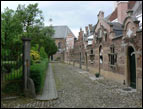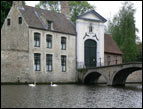CHURCH
HISTORY
How Medieval Women Kept Revival Alive
By Glenn E. Myers, Ph.D.
Guest Writer
CBN.com
-- The age of chivalry filled Europe with castles, knights and ladies in waiting. Numerous men traveled abroad on the crusades while troubadours toured the countryside, singing songs of unrequited love. Spiritually, however, Christendom was dry. Although everyone in Europe was part of the church, for hundreds of years the gospel had failed to impact the average person in the village.
Beginning in the twelfth century the spiritual climate changed rapidly. Itinerant evangelists began to crisscross the landscape, calling both people and priests to conversion—to repent of their worldly living and enter into a personal relationship with Christ. Like a match set to dry grass, their preaching ignited flames of revival that blazed across Christendom. By the hundreds and then the thousands, people responded to the gospel in this little-known spiritual renewal. From their writings we know that they had a genuine encounter with Jesus and embarked on a profound walk with him.
 One of the most fascinating developments in this widespread renewal took place among the middleclass women in towns across Belgium, the Netherlands, northern France and Germany. As women came to Christ, they began to establish their own Christian communities for the purpose of pursuing the Lord. These laywomen pooled their resources to buy houses where they could live together as sisters. Some were widows whose husbands had died in the crusades. Others were single maids who had moved to the growing towns to find employment. Together they formed households for spiritual formation. One of the most fascinating developments in this widespread renewal took place among the middleclass women in towns across Belgium, the Netherlands, northern France and Germany. As women came to Christ, they began to establish their own Christian communities for the purpose of pursuing the Lord. These laywomen pooled their resources to buy houses where they could live together as sisters. Some were widows whose husbands had died in the crusades. Others were single maids who had moved to the growing towns to find employment. Together they formed households for spiritual formation.
Known as Beguines, these godly women pulsated with a love for their Savior, a desire to grow in him and a passion to know him more (Phil. 3: 10). Mechthild of Magdeburg, one of the early Beguines in Germany, wrote:
O Lord, if it could ever happen to me that I might gaze upon you as my heart desires and hold you in my arms, then the divine pleasures of your love would needs permeate my soul to the degree possible for people on earth. What I would be willing to suffer thereafter has never been seen by human eyes. Indeed, a thousand deaths were too little. Such, Lord, is my painful longing for you! (Mechthild, 134)
Spread of Revival
So many came to Christ through this spiritual renewal that in Belgium alone more than ten thousand women joined the Beguine movement within two generations. At first they purchased houses where a dozen women could live together. Then, just after the year 1230, the movement exploded. Pope Gregory IX gave official approval to these lay communities. About the same time Countess Johanna of Flanders donated tracts of land, enabling the women to build larger Beguine complexes. Soon other nobility and a number of bishops endowed them with land and funds.
Known as beguinages, in French, and Begijnhoven, in Dutch, these complexes were walled communities with scores of townhomes, usually built around a large central courtyard the size of several football fields placed side-by-side. Encircled by a large wall for safety, the women formed their own small town, as it were, with gardens to grow vegetables and a church building where they could meet each morning and evening. Within twenty years, Beguines established over sixty such complexes in Belgium—each housing over one hundred women. Several of these developed into beguinages of tremendous proportion: Ghent’s accommodating 700  women, Liège 1000, and Mechelen eventually holding some 1900 Beguines! women, Liège 1000, and Mechelen eventually holding some 1900 Beguines!
One of the most beautiful Beguine complexes still stands in the city of Bruges. Today nuns reside in this peaceful beguinage. Visitors are invited to enjoy the quiet grounds and observe the vespers service each evening. Although only a few Beguines continue today in Belgium, their spiritual heritage lives on and invites contemporary Christians to pursue a deeper relationship with Christ.
Why Form Communities?
Beguine communities offered many hungry Christians in the late Middle Ages their only opportunity to hear God’s Word on a daily basis. Because it was several centuries before the printing press, Bibles were not available to individuals or families. However, communities such as those of the Beguines could purchase portions of the Scripture for their corporate use. Morning and evening they gathered to hear one member read a passage, and then they treasured God’s Word in their hearts (Psalm 119: 11). As they worked throughout the day, these women meditated on the passage while they spun wool or pressed linen.
In addition, Beguine communities provided a context in which thirsty believers could cultivate their personal relationship with Christ. Women found like-minded believers with whom they could build spiritual friendship. In community they encouraged each other in their walk with Christ and challenged one another to grow. The younger women sought older sisters to mentor them and provide direction and encouragement in their spiritual pilgrimage.
Beguine communities served as both sanctuary and soup kitchen in their day. While the women nurtured a profound relationship with Jesus, they also served him by helping the neediest around them. Some of the very first groups of Beguines came together to care for the infirm.
The emerging cities of northern Europe had no hospitals to care for the sick and lepers who lived in the area. Neither did they have a welfare system to provide for the poor and hungry. Such ministry was left in the hands of believers—laywomen for the most part—who heard Jesus’ commandment to love others and who obeyed in the most practical of ways. Thus many of the first hospitals were established by these devout women.
As hundreds joined the Beguine houses, many of the women needed to work to support themselves financially. Some served as teachers or nannies for the wealthy families in town. The vast majority worked with their hands in Belgium’s booming textile industry to earn a living. They lived sparingly and gave any remaining money to the poor.
Medieval Mentors
These saintly women from days gone by have much to teach us. Ours is a world of individualism and self-absorption. Even among Christians the emphasis is continually placed on our private pursuit of spiritual formation and self-fulfillment. As a result, we are frequently self-focused and frenetically busy, yet we seldom accomplish what we hope or arrive at a place of rest. Above all we fail to feel connected—with others, ourselves or the Lord.
Striving to gain more and go faster, we have lost our inner peace.
To such a chaotic contemporary existence, the women of the thirteenth century send an invitation, offering us a fuller life and greater intimacy with the Lord. By their writings and their example, they would mentor us if we would but listen.
First, the Beguines welcome us to savor Scripture.
Having so many Bibles on our bookshelves, we forget the privilege it is to own a copy of God’s Word. In our busy schedules we often rush through a few verses before we head out the door, and we fail to allow his Word to permeate our minds and hearts. The Beguines serve as a wonderful role model regarding what it means to soak in Scripture, treasure a passage throughout the day, reflecting on it and allowing it to transform our thought and life.
Second, the women of the thirteenth century summon contemporary Christians to cultivate community.
While their faith was very personal, it was never a private affair. They shared close fellowship with likeminded sisters as well as reaching out to those beyond their walls. “How good and pleasant it is when God’s people live together in unity!” (Psalm 133:1). The Beguines challenge us to follow their example of service to the poor and ailing in their cities. Our spiritual progress was never meant to be detached from our love of others.
Through their writings, these women also welcome us to explore with them the relational dynamics of a lifelong friendship with the Lord.
True relationship is dynamic, never static or boring. The Beguines take us on a venture into the many sides of our love for Jesus. That journey begins with tearful gratitude for his sacrifice on the cross and develops into active service for him. Sometimes our walk with the Lord is peaceful and gratifying. Other times it is stormy and full of yearning. Lifelong friendship with God engages the entire spectrum of human emotion and calls us into full participation with our hearts, minds, wills and bodies.
Above all, the Beguines invite us into a deeper communion with the Lord.
They saw themselves as brides of Christ—wed to Jesus, the heavenly Bridegroom. They responded to the Lover’s call in Song of Songs 2:13, “Arise, come, my darling; my beautiful one, come with me,” and they summoned others to join them in their relationship with Jesus. Today we can still read the inscription above the entryway to what was once the Beguine complex in the city of Diest, welcoming other women into a genuine relationship with the Lord:
Come into my courtyard,
My sister bride!
That call reverberates over the centuries, bidding believers in our day to foster an intimate communion with Jesus.
From first to last these women were in radical pursuit of Christ and beckoned other believers to join them in a lifelong spiritual pilgrimage. They still serve as mentors for us: challenging us to press onward, guiding us during dark times and always welcoming us into a deeper relationship with the Savior who died on the cross out of his infinite love for us. The call to an ever-closer walk with Christ echoes today. My prayer is that we would respond anew to that invitation.
 Seeking Spiritual Intimacy Seeking Spiritual Intimacy
Send Glenn your e-mail feedback.
Learn more at Glenn's Blog: deepwellswithglennmyers.blogspot.com
More Church
History on Spiritual Life
More Bible Study & Theology on Spiritual Life
More Spiritual Life
For Further Reading
Hadewijch: The Complete Works. Translated by Mother Columba Hart. In The Classics of Western Spirituality. Mahwah, NJ: Paulist Press, 1980.
Mechthild of Magdeburg. The Flowing Light of the Godhead. Translated by Frank Tobin. In The Classics of Western Spirituality. Mahwah, NJ: Paulist Press, 1998.
Simons, Walter. Cities of Ladies: Beguine Communities in the Medieval Low Countries, 1200 – 1565. Philadelphia, PA: University of Pennsylvania Press, 2001.
 Glenn E. Myers is a professor of Church History at Crown College with a specialization in the history of Christian Spirituality. His passion is introducing contemporary Christians to the wisdom, depth and vitality of spiritual leaders from the past two thousand years of the church. Receiving an M.Div. from Gordon-Conwell Theological Seminary and a Ph.D. in church history from Boston University, Dr. Myers has served as a pastor, a missionary and a professor. Glenn E. Myers is a professor of Church History at Crown College with a specialization in the history of Christian Spirituality. His passion is introducing contemporary Christians to the wisdom, depth and vitality of spiritual leaders from the past two thousand years of the church. Receiving an M.Div. from Gordon-Conwell Theological Seminary and a Ph.D. in church history from Boston University, Dr. Myers has served as a pastor, a missionary and a professor.
In 1995-1996, he and his wife Sharon ministered with CBN in Kiev. Currently Glenn serves on the board at Restoration Ministries, Inc., offers retreats and provides spiritual direction. He is a contributor to Zondervan Press’ forthcoming Dictionary of Christian Spirituality and is nearing completion of a book on the Beguines. Offering fresh spiritual water to thirsty saints today, he authors a blog: deepwellswithglennmyers.blogspot.com.
© Glenn E. Myers. Used with permission.
CBN IS HERE FOR YOU!
Are you seeking answers in life? Are you hurting?
Are you facing a difficult situation?
A caring friend will be there to pray with you in your time of need.
|